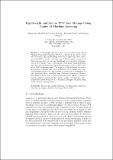Lightweight and secure PUF key storage using limits of machine learning
Author(s)
Yu, Meng-Day (Mandel); M’Raihi, David; Sowell, Richard; Devadas, Srinivas
DownloadDevadas-Lightweight and secure.pdf (1.137Mb)
OPEN_ACCESS_POLICY
Open Access Policy
Creative Commons Attribution-Noncommercial-Share Alike
Terms of use
Metadata
Show full item recordAbstract
A lightweight and secure key storage scheme using silicon Physical Unclonable Functions (PUFs) is described. To derive stable PUF bits from chip manufacturing variations, a lightweight error correction code (ECC) encoder / decoder is used. With a register count of 69, this codec core does not use any traditional error correction techniques and is 75% smaller than a previous provably secure implementation, and yet achieves robust environmental performance in 65nm FPGA and 0.13μ ASIC implementations. The security of the syndrome bits uses a new security argument that relies on what cannot be learned from a machine learning perspective. The number of Leaked Bits is determined for each Syndrome Word, reducible using Syndrome Distribution Shaping. The design is secure from a min-entropy standpoint against a machine-learning-equipped adversary that, given a ceiling of leaked bits, has a classification error bounded by ε. Numerical examples are given using latest machine learning results.
Description
13th International Workshop, Nara, Japan, September 28 – October 1, 2011. Proceedings
Date issued
2011-09Department
Massachusetts Institute of Technology. Department of Electrical Engineering and Computer ScienceJournal
Cryptographic Hardware and Embedded Systems – CHES 2011
Publisher
Springer Berlin / Heidelberg
Citation
Yu, Meng-Day et al. “Lightweight and Secure PUF Key Storage Using Limits of Machine Learning.” Cryptographic Hardware and Embedded Systems – CHES 2011. Ed. Bart Preneel & Tsuyoshi Takagi. LNCS Vol. 6917. Berlin, Heidelberg: Springer Berlin Heidelberg, 2011. 358–373.
Version: Author's final manuscript
ISBN
978-3-642-23950-2
ISSN
0302-9743
1611-3349